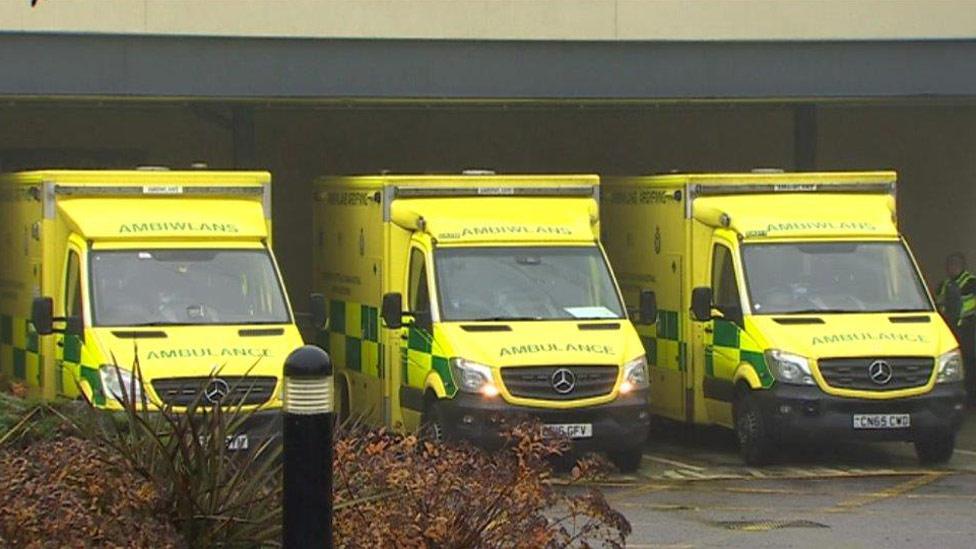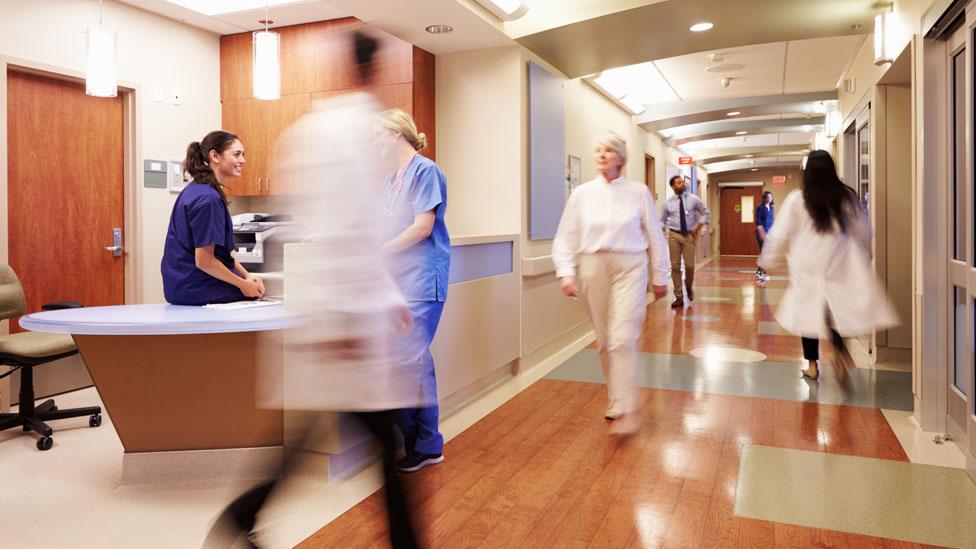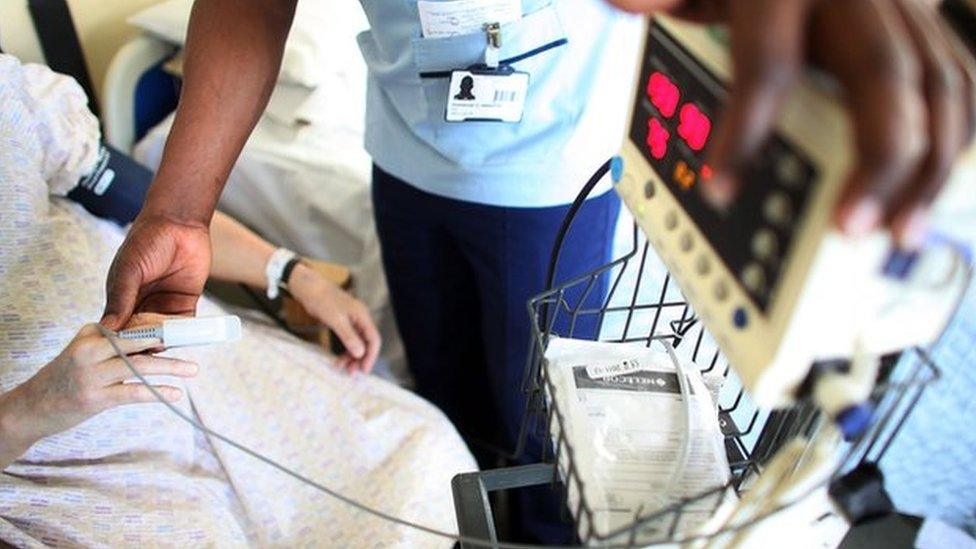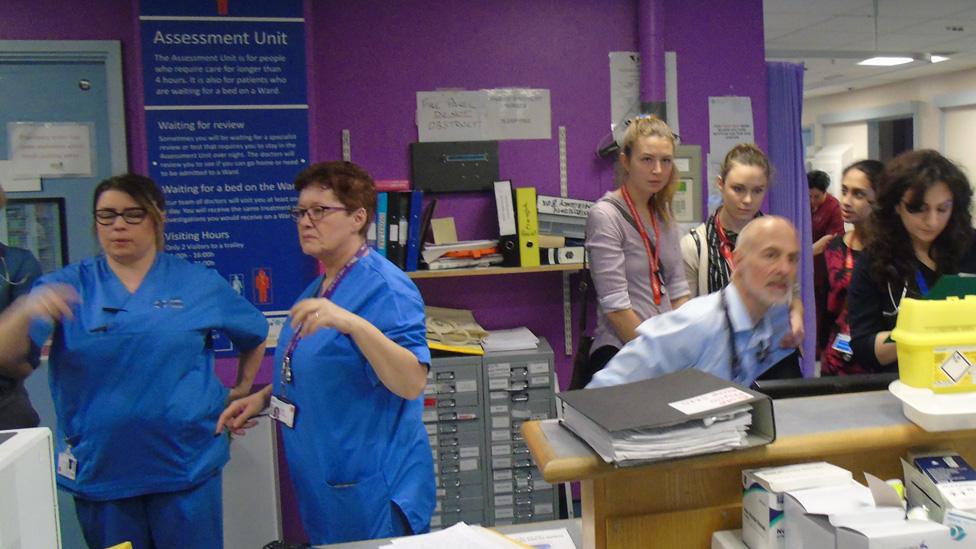Winter pressures meant 'perfect storm' in NHS Wales
- Published

The ambulance service had its busiest month in December on record
Health and social services in Wales faced a "perfect storm of pressures" last winter, according to a review into how they coped.
The evaluation found a small number of patients experienced long delays.
Services faced an "extremely challenging period," including blizzards and the worst flu season since 2009.
NHS Wales' chief executive has already commissioned a review into the adequacy of bed stock to deal with demand.
Hospital managers, doctors, patients and care providers contributed to the study - which also makes recommendations for improvements.
It comes as a £20m package was announced to ease pressures this coming winter.
Better planning last winter - the busiest on record - helped prevent an already difficult situation from escalating.
But the review, commissioned by the Welsh Government and NHS Wales, found some health providers were "spread betting" and had too many initiatives - there were 159 different ones across the health service from last December to March.
Health Secretary Vaughan Gething welcomes an honest review of the NHS experience last winter
It suggests five priorities for the next winter - including better management of peaks in pressure and ways to minimise and avoid hospital admissions.
Staff in parts of the health system had a winter spent under "significant and unrelenting pressure", which hit their workload and morale.
Issues in the Welsh Ambulance Service highlighted:
An increase in the average response time by the ambulance service to "amber" patients of 15 minutes 58 seconds compared to the previous winter. A small rise in adverse incidents as a result of the delayed response.
An issue of ambulances parked up outside of A&E, largely caused by GP referrals of patients - and a second wave of pressure outside hospitals in the evenings after surgeries closed.
More lost ambulance hours due to handover delays in January (9,970) than any other month going back to April 2015.
"Anecdotal evidence" to suggest patients called 999 when struggling to get a response from GP out-of-hours services.

What were the biggest headaches around Wales?
Aneurin Bevan health board reported the "fragility of GP practices" and the number of GPs struggling to support the demand and needs of patients".
Betsi Cadwaladr reported high bed occupancy was the most significant challenge over the winter period but significant changes were needed in behaviour, systems and culture.
Cwm Taf said it had problems with staffing levels when demand surged; Hywel Dda pointed to lengthy waits at A&E and nurse staffing issues and Cardiff and Vale highlighted short term recruitment issues.

But the review found that while some patients faced unacceptable waits, the majority received "timely and safe care" and satisfaction levels were high.
Wales, in common with other UK nations, has seen a 20% reduction in hospital beds over the last decade - with more patients treated as day cases and in the community - but the bed occupancy rate is close to 90% and so there is little slack in the system.
The chief executive of NHS Wales has now commissioned a review of the adequacy of the current bed stock to deal with demand surges.
It comes with more patients and a loss of 1,000 elderly care home places leading to a "significant strain on the hospital system and its ability to maintain patient flow".
Over 2,700 NHS beds have gone in Wales between 2006/07 and 2016/17 - two thirds of these were community hospital beds and a third from general hospitals.

The number of elderly patients - including those over 85 - with complex problems were taking up beds and there were "clear opportunities" for improvement between NHS and social services in discharging them back into the community.
This was made worse by a lack of available social care packages over the post-Christmas and New Year period.
The review also looks at how the health and care services are collaborating - with the aim of getting more people treated in their communities.
"Whilst there is clear evidence of NHS Wales and social care services across Wales working together towards a care closer-to-home model, the pace of change in the way services are delivered across the system does not match the pace of change in population needs in recent years," says the review.
Problems for local authorities in meeting demand for home care packages in several health board areas had worsened, most noticeably in Hywel Dda, Powys, Aneurin Bevan and Betsi Cadwaladr.
- Published25 October 2018

- Published18 January 2018

- Published3 January 2018

- Published5 January 2018
